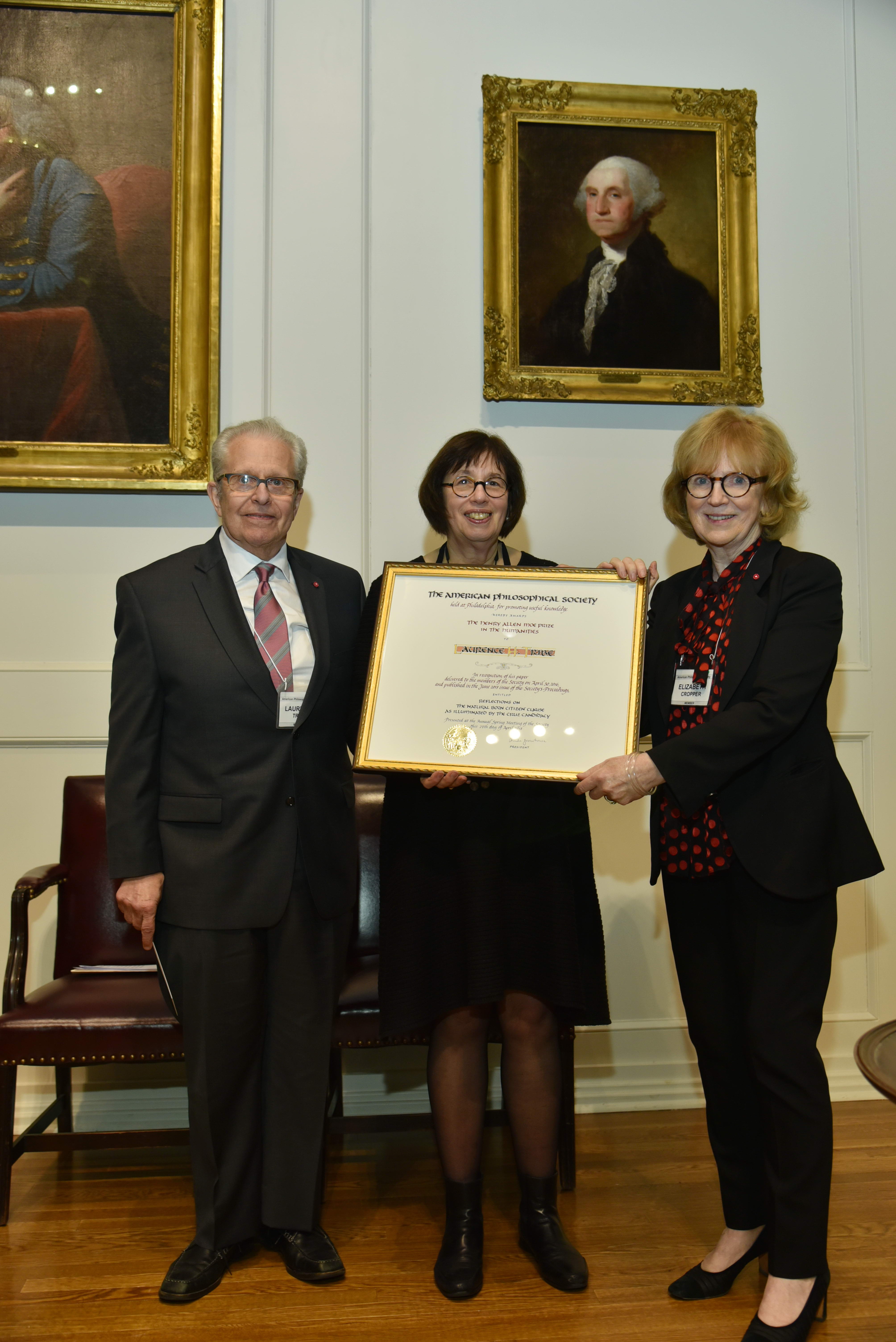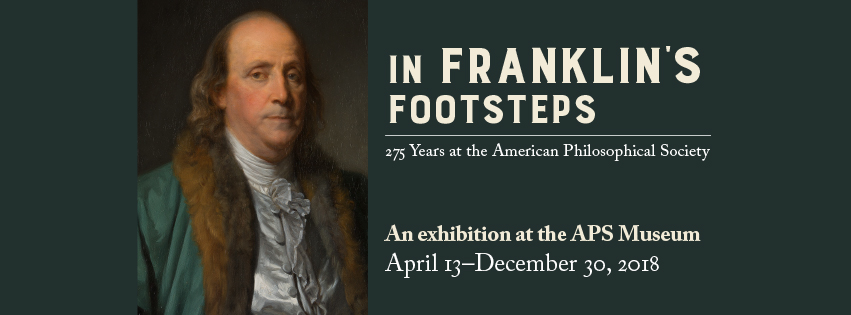FOR IMMEDIATE RELEASE
Contact: Jessica Frankenfield
Phone: 215-701-4427
Email: [email protected]
Museum Exhibition In Franklin’s Footsteps: 275 Years at the American Philosophical Society Opens April 13, 2018
Philadelphia [April 13, 2018]—They calculated the size of the solar system, explored distant lands, shed light on the origins of life, unearthed ancient fossils, invented computer technologies, cured diseases, and walked on the moon. What did these accomplished people have in common? They were Members of the American Philosophical Society. Opening April 13, 2018, the new exhibition at the APS Museum, In Franklin’s Footsteps: 275 Years at the American Philosophical Society, tells the story of the nation’s oldest learned society and how its Members have changed the world.
When Benjamin Franklin founded the American Philosophical Society in 1743, he recognized the need for an organization that would bring together the brightest thinkers of the day to share their scientific experiments, from the esoteric to the deeply practical. He named the Society for the then-common term for the study of science—“natural philosophy.”
In Franklin’s Footsteps shows how APS Members have continued Franklin’s Enlightenment mission since 1743. The exhibition reveals their work through three themes inspired by Franklin’s original charge for Members to pursue “all philosophical Experiments that let Light into the Nature of Things, tend to increase the Power of Man over Matter, and multiply the Conveniencies or Pleasures of Life.”
Highlights in the exhibition include Benjamin Franklin’s library chair, an original journal from the Lewis and Clark Expedition, Charles Darwin’s handwritten title page of On the Origin of Species, and Neil Armstrong’s annotated and signed copy of the moon landing transcript. The exhibition draws out stories of collaboration and debate on divisive topics, many of which have occurred at the Society’s biannual Meetings of Members and in APS publications. A section on nuclear energy covers APS Members’ contributions to atomic research, including materials from Enrico Fermi, E. U. Condon, and Henry DeWolf Smyth. These scientific breakthroughs prompted APS Members to hold a symposium on the ethics of nuclear weapons at a 1945 Meeting, which featured remarks from J. Robert Oppenheimer and resulted in a letter to President Truman advocating for freedom of academic research on atomic energy.
The exhibition also includes items from one of the APS Library’s most frequently requested material—the eugenics collection. Members like Charles Davenport and Alexander Graham Bell advocated for the eradication of “unfit human traits,” while critics of the movement like anthropologist Franz Boas dedicated their work to celebrating and better understanding the diversity of human culture. APS Members today continue to discuss challenging topics with recent Meeting symposiums on climate change, the nature of democracy, and the future of higher education.
Special labels written by current APS Members show the enduring significance of objects selected for the exhibition. Climate scientist Warren M. Washington highlighted the importance of explorer Elisha Kent Kane’s meteorological data collected in Greenland from 1853 to 1855. This type of historical record allows scientists like Washington to track long-term climate trends. Anthropologist and paleobiologist Nina Jablonski’s label accompanies the handwritten title page to Charles Darwin’s On the Origin of Species. Jablonski noted that Darwin only mentioned humans once in the book, but he provided the theoretical framework for understanding human evolution.
The exhibition opening also will unveil the product of a Super Bowl bet with the Boston-based American Academy of Arts and Sciences (i.e. Patriots fans.) The Eagles beat the Patriots and the APS received from AAAS a loaned set of Benjamin Franklin’s manuscript writings on his electricity experiments.
APS Museum Director Merrill Mason said, “I hope visitors will be surprised with the variety of historical objects and topics represented in this exhibition—everything from Franklin to the moon—and that they will come away with some memorable stories about our Members.”
Since the exhibition can only hold a small fraction of the Society’s 13 million treasures, visitors will be able to explore the collections more deeply via a touch-screen kiosk. This interactive display will allow visitors to learn more about objects from the APS Museum and Library in the areas of Early American History, History of Science, Natural History, and Native American History, plus fun finds in the Surprise Me! and Staff Favorites categories.
Over the course of the exhibition, a sculpture of the extinct giant ground sloth Megalonyx jeffersonii will be installed piece by piece in the Thomas Jefferson Garden (across the street from Philosophical Hall). In 1797, Jefferson presented a paper on this then-unidentified fossil to his fellow Members of the Society, detailing his theory that the creature may still be alive and, judging by the size of its claws, must be from a ferocious animal like a lion or tiger. Jefferson was correct that this creature was massive, but it turned out to be an herbivorous gentle giant.
The opening reception will be held on Friday, April 13 at 5:30 p.m. in the Society’s Philosophical Hall. APS President Linda Greenhouse will deliver opening remarks and guests will be able to tour the exhibition. The opening date was selected to coincide with Thomas Jefferson’s 275th birthday.
Special events will complement the themes of the exhibition, including a series of lectures entitled “Useful Knowledge 101” that will cover unexpected yet practical topics on everything from the ecology of Philadelphia to the history of beer. There will be family-friendly programs throughout the summer on the second Saturday of each month, and the Annual Garden Party in October.
The exhibition will be open Thursday–Sunday through December 30, 2018 in Philosophical Hall, 104 South Fifth Street, Philadelphia. Admission is free, but donations are encouraged. Groups can schedule tours by contacting [email protected].
About the APS Museum
Founded in 2001, the APS Museum is located adjacent to Independence Hall in Philadelphia’s historic district. It develops thematic exhibitions from the Society’s collections of over 13 million manuscripts, rare books, artworks, scientific instruments, Native American materials, and other historical objects. Programs expand upon the themes and objects in the exhibitions and relate them to relevant issues today.



